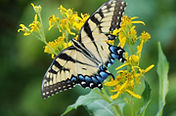Park Activities
Calendar of Events
Volunteer Programs
Sky Meadows Park
Location
Geography
Habitats
Trails
Visiting Park
Crooked Run Valley
Special Projects

Dogbane
Apocynaceae is a family of flowering plants that includes trees, shrubs, herbs, stem succulents, and vines, commonly called the dogbane family, after the American plant known as dogbane, Apocynum cannabinum. Members of the family are native to European, Asian, African, Australian, and American tropics or subtropics, with some temperate members.
The family comprises some 5,100 species. Apocynoideae, Asclepiadoideae, Periplocoideae, Rauvolfioideae, and Secamonoideae are the 5 subfamilies of Apocynaceae as of 2012. What is included in the family may change with new genetic data. The former family Asclepiadaceae is included in Apocynaceae according to the APG III system. An updated classification, including 366 genera, 25 tribes and 49 subtribes, was published in 2014.
Several plants of this family had economic uses in the past. The genera
Landolphia, Hancornia, Funtumia and Mascarenhasia were used as a commercial source of inferior rubber. Several genera are grown as ornamental plants, including Amsonia (bluestar), Nerium (oleander), Vinca (periwinkle), Carissa (Natal plum, an edible fruit), Allamanda (golden trumpet), Plumeria (frangipani), Thevetia (lucky nut), Mandevilla (Savannah flower), Adenium (desert-rose). Some are sources of important drugs, such as cardiac glycosides, which affect heart function. These include the Acokanthera, Apocynum, Cerbera, Nerium, Thevetia and Strophanthus. Rauvolfia serpentina, or Indian Snakeroot, yields the alkaloids reserpine and rescinnamine, which are useful tools in the treatment of high blood pressure and even some forms of psychosis. Catharanthus roseus yields alkaloids used in treating cancer.
